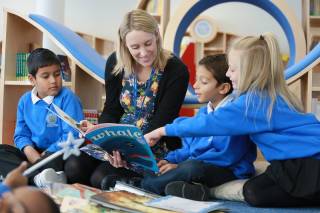Reading Recovery and other interventions work well together offering different approaches to make sure all pupils make good progress in literacy.
Rosslyn Park is a three-form entry primary school situated in an area of Nottingham, ranked as one of the 10% most deprived neighbourhoods in the country. When the current head teacher took over, the school was in special measures. Key to the school’s development was raising standards in literacy. As part of that goal, Read Write Inc, the structured synthetic phonics programme was brought in. Progress in both phonic skills and text reading and writing are conducted every half term to construct a safety net to protect all pupils. The school appointed a Phonics Coordinator who reviews progress along with the school’s Reading Recovery teacher. At that point, the assessments are analysed to evidence a response via extra support or intervention. Y1 Pupils who are not making expected progress in the school’s literacy programme are offered Reading Recovery. This different approach ensures that the school can respond to a range of individual needs by providing an individualised programme. This, reports the head teacher, Scott Mason, is highly effective. For example, a Y1 pupil who spent 2 terms in the lowest phonics group struggling to make any progress was offered Reading Recovery and within 12 weeks he had met age related expectations. He went on to be assessed at the end of Key Stage 1 as reaching secure Year 2 outcomes in reading.
“Mr Mason sees communication between the class teacher, the Phonics Coordinator and the Reading Recovery teacher as one of the reasons that the school’s approach is so effective.
The sharing of data and continuing liaison ensures that class teachers of pupils who are identified for extra support are aware of progress made in Reading Recovery, particularly in phonics, so that children can continue to access high quality systematic phonics teaching. The knowledge and skills of the RR teacher is also crucial to ensuring that the literacy curriculum also maintained a strong focus on reading comprehension alongside decoding skills and that children learn how to use their phonic knowledge as part of their text reading repertoire. Mr Mason considers that Read Write Inc and Reading Recovery work well together, offering different approaches to make sure all pupils make good progress in literacy. He says:
"Over the last two years we have developed a coordinated approach to the teaching of reading based on the understanding that children learn to read in a variety of ways. A key ingredient of this ‘toolkit’ approach has been Reading Recovery with our highly skilled Reading Recovery teacher working dynamically as part of KS1 team to identify the best approach to reading for each child. This has seen provision and outcomes throughout the school improve dramatically with the school receiving a National Support School designation from the DfE in March 2018”.
 Close
Close


